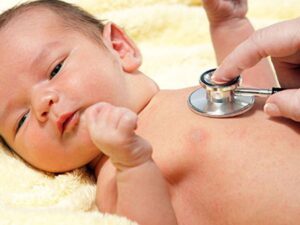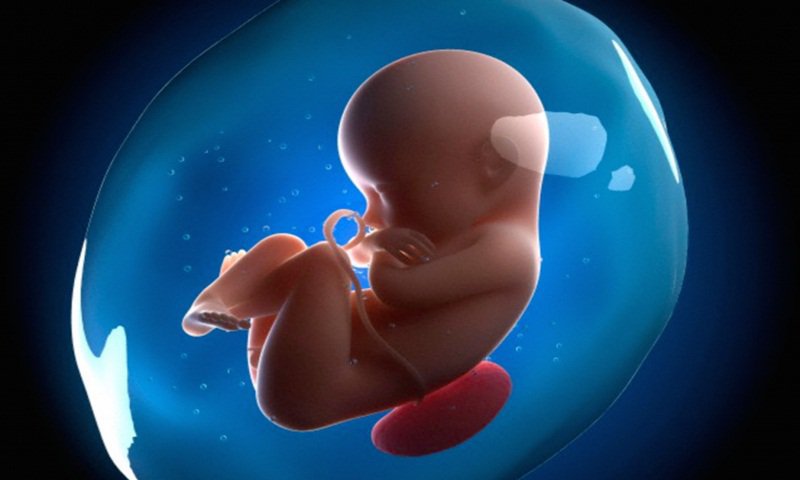Fetal malnutrition is a condition where the fetus is poorly or slowly developing. There are many causes of fetal malnutrition. After birth, children may be underdeveloped in terms of height and weight, often suffering from infections, which is one of the complications associated with fetal malnutrition.
1. Overview of fetal malnutrition
Fetal malnutrition is the condition where the fetus is poorly or slowly developing in the mother’s womb.
Fetal malnutrition can be detected through regular prenatal check-ups, based on measurements obtained through ultrasound such as length, weight, head circumference, abdominal circumference, thigh length, and the height of the mother’s uterus.
If, after birth, the child weighs less than 2.5 kg despite being full-term, they are considered to be suffering from fetal malnutrition.
2. Causes of fetal malnutrition in children
There are many causes of fetal malnutrition in children such as:
- Maternal age: Older mothers (>35 years old) who become pregnant are at increased risk for fetal issues such as malnutrition, congenital heart defects, Down syndrome, cleft lip and palate, etc.
- Nutritional intake during pregnancy: If the mother does not ensure an adequate diet with sufficient protein, carbohydrates, fats, and vitamins and minerals during pregnancy, it may affect the mother’s health and the development of the fetus.
- Maternal health: During pregnancy, if the mother contracts bacterial infections, influenza, etc., it will affect the development of the fetus, increasing the risks of congenital defects and fetal malnutrition.
- Overexertion: If the pregnant mother works excessively or is in a harmful, polluted work environment, has a heavy workload, or is under constant pressure and stress, it will also affect the development of the fetus.

3. Common complications from fetal malnutrition in children
Fetal malnutrition can lead to severe complications regarding both the physical and mental health of the child:
- Susceptibility to infections: Children who experience malnutrition early in the fetal stage will lack essential minerals and vitamins, affecting their immune system, thereby increasing the chance of viral and bacterial infections. When a child’s immune system is weakened, the protective functions of both internal and external organs are compromised, making the child more susceptible to illnesses than normally developed children, including conditions like dry eyes, measles, pneumonia, respiratory infections, diarrhea, digestive disorders, etc.
- Hypothermia: Children with fetal malnutrition are very sensitive to the temperature of the external environment. Therefore, after birth, if the child is not kept warm, they may quickly suffer from hypothermia, which can endanger their life.
- Maternal health: During pregnancy, if the mother contracts bacterial infections, influenza, etc., it will affect the development of the fetus, increasing the risks of congenital defects and fetal malnutrition.
- Overexertion: If the pregnant mother works excessively or is in a harmful, polluted work environment, has a heavy workload, or is under constant pressure and stress, it will also affect the development of the fetus.
3. Common complications from fetal malnutrition in children
Fetal malnutrition can lead to severe complications regarding both the physical and mental health of the child:
- Susceptibility to infections: Children who experience malnutrition early in the fetal stage will lack essential minerals and vitamins, affecting their immune system, thereby increasing the chance of viral and bacterial infections. When a child’s immune system is weakened, the protective functions of both internal and external organs are compromised, making the child more susceptible to illnesses than normally developed children, including conditions like dry eyes, measles, pneumonia, respiratory infections, diarrhea, digestive disorders, etc.
- Hypothermia: Children with fetal malnutrition are very sensitive to the temperature of the external environment. Therefore, after birth, if the child is not kept warm, they may quickly suffer from hypothermia, which can endanger their life.
- Work and rest reasonably, avoiding stress and pressure that can affect the fetus.
- Regular prenatal check-ups to promptly detect any abnormalities in health as well as the condition of the fetus.
- Do not use stimulants during pregnancy, such as tobacco and alcohol.
- Avoid becoming pregnant and giving birth under the age of 18 or over 35 to reduce the risk of fetal malnutrition.
- If suffering from chronic illnesses, it is necessary to cure the disease before becoming pregnant, especially diseases transmitted from mother to child.

Children suffering from fetal malnutrition after birth need careful care to minimize the risk of potential complications.

